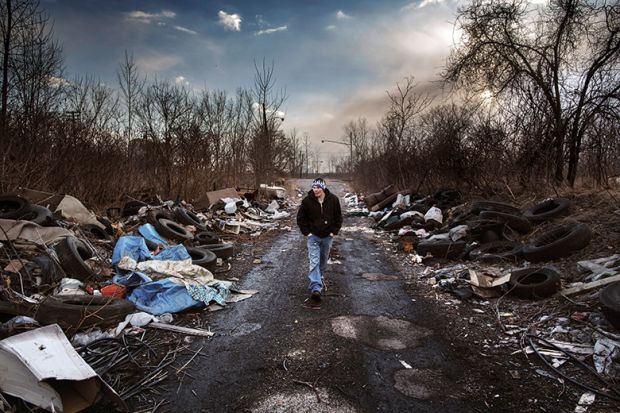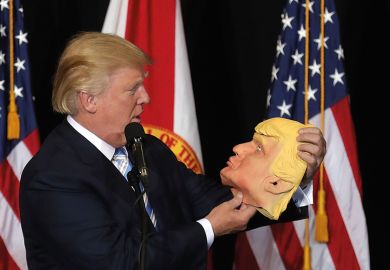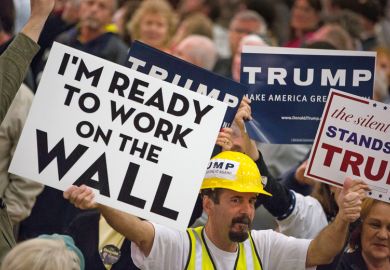Academics need to be central in addressing the impacts of deindustrialisation and free trade that many believe have driven the “Rust Belt revolt” that helped to deliver the US presidency to Donald Trump, according to scholars.
Mr Trump’s victory last week, which has sent shock waves through society in the US and across the world, was partly achieved thanks to winning states such as Michigan, Pennsylvania and Wisconsin – which had all backed the Democrats since at least 1992 – as well as Ohio, a swing state that twice backed Barack Obama.
His success in the nation’s former industrial heartland, often termed the Rust Belt, has been likened to the UK’s Brexit vote, which also gained strong support in many deindustrialised areas.
Paul Sracic, professor and chair of the department of politics and international relations at Youngstown State University in Ohio, said the voter numbers “are really stunning if you look in places like Ohio, Wisconsin, and you look at how well Donald Trump did with union voters, for example, versus what Mitt Romney had done four years earlier. I think that was critical.”
Professor Sracic, who has written for outlets including CNN.com, USA Today and The Washington Post, said in September that Mr Trump was winning high levels of working-class support in Ohio.
Jon Teaford, emeritus professor at Purdue University, a specialist in urban history and author of Cities of the Heartland: The Rise and Fall of the Industrial Midwest, said: “The election results seem to have shocked and surprised many pundits and professors who were especially taken off guard by the strength of the revolt in the Rust Belt.”
He added: “There have been a multitude of articles and books on such classic Rust Belt cases as Detroit, but that’s not where Trump and the Republicans picked up their victory.
“The smaller Rust Belt cities and towns went inordinately for Trump, and these were often the hardest hit by deindustrialisation and [are] the areas which feel most neglected by commentators and national leaders.”
Mr Trump targeted the region and repeatedly blamed the North American Free Trade Agreement (Nafta), signed by Bill Clinton during his presidency, for the closure of factories and the loss of manufacturing jobs to Mexico. He attacked his rival Hillary Clinton over Nafta during the presidential debates.
Professor Sracic sees a responsibility for the region’s academics to communicate on “the benefits” of trade and to see it as a political as well as an economic issue.
He said: “We are one of the most export-dependent regions of the country, yet we overwhelmingly support a candidate who says that free trade is a bad thing.”
He thought that his own university “should take a much more active role, in organising a conference on trade, for example” and added that academics should not be afraid to engage more with voters.
Professor Sracic said that he often appeared on television to discuss politics and found that working-class voters from the area would later approach him and thank him for his explanations about, say, the electoral system.
“I don’t see this hostility towards academics. If you’re willing to speak [to people] in a language they understand…if you know your material, I think you can do that.”
Steven High, professor of history at Concordia University and author of Industrial Sunset: The Making of North America’s Rust Belt, described “deindustrialisation studies” as a well-established field of research since the 1980s, when the “industrial crisis” began.
Professor High, whose research has used oral history to tell the stories of former industrial workers, added: “We know a fair amount about the effects of mill and factory closures on workers, their families and their local communities. We don’t know nearly enough about the wider political impact of deindustrialisation.”
He continued: “Industrial liberalism in the US was grounded in the union movement. With its collapse, we have seen [industrial liberalism’s] decline among the white working class. This has yet to be studied.”
Professor High said: “If nothing else, the Brexit vote and Trump’s election have shattered the public silence around deindustrialisation.”
POSTSCRIPT:
Print headline: Academics must address the ‘Rust Belt revolt’
Register to continue
Why register?
- Registration is free and only takes a moment
- Once registered, you can read 3 articles a month
- Sign up for our newsletter
Subscribe
Or subscribe for unlimited access to:
- Unlimited access to news, views, insights & reviews
- Digital editions
- Digital access to THE’s university and college rankings analysis
Already registered or a current subscriber?








